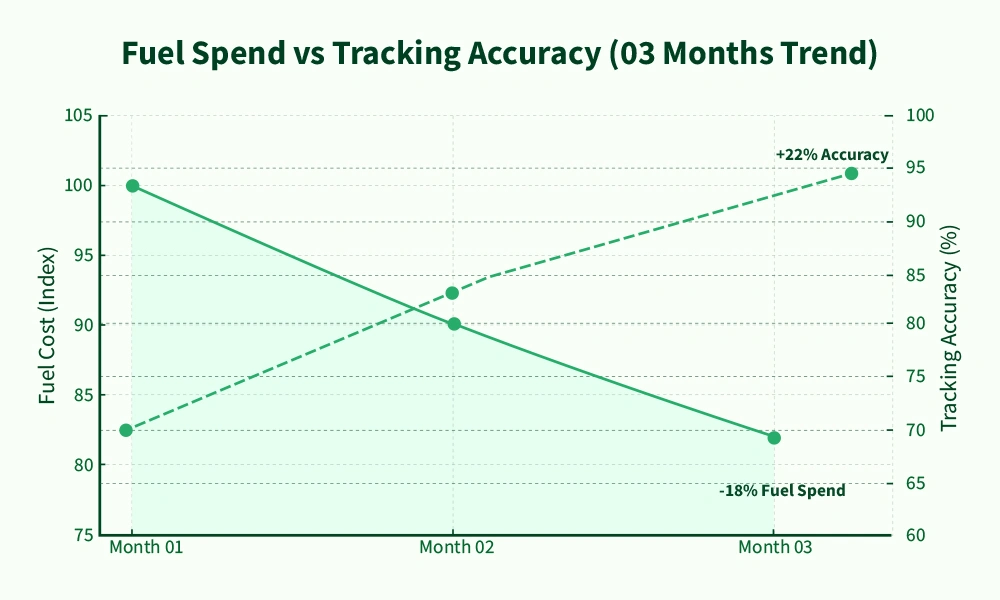Benefits of Fleet Management System

Fleet management is not merely keeping the trucks rolling, but making them run their worth in terms of cutting unnecessary expenditure and being the first ahead of the competition. The benefits of the fleet management system are far wider than simple tracking of vehicles. These systems are making owners, operators, and fleet managers smarter every day through real-time diagnosis, automated service reminders, mobile wrench time, and detailed reporting. In the case of multiple trucks to manage or a national-scale business, the appropriate fleet management system features can improve the bottom line, safety, and efficiency of your business to the next level.
The other main aspects that can be gained from fleet management system are the capacity to minimize the operational-related headaches and to simplify compliance. Eliminating back-office bottlenecks. Excluding back-office bottlenecks, you can do with automated DOT inspections, reminders, and proactive truck preventive maintenance, as well as centralized business data to support billing and dispatch. Other benefits of fleet management system are enhanced accountability of the drivers, fewer chances of common fleet accidents, and increased customer satisfaction. These advantages of fleet management are vital when a business intends to expand, but it does not want to risk the loss of control or likely overhead costs.
Why Fleet Management is Important?
The significance of fleet management is that the bottom line of your company and its image will reflect on it. Increasing fuel prices, lack of drivers, and strict delivery demands have made efficiency a non-negotiable thing. An effective fleet management system assists you in optimizing routes, assessing the performance of the drivers, and making sure that vehicles are ready to take the next job. It translates to less delay, reduced costs, and satisfaction to customers, which is a factor as to why fleet management is important in the current logistics environment.

The importance of fleet management also lies in its capacity to make your business compliant and safe. DOT inspection alerts, real-time GPS monitoring, and simple reporting should have you on the latest rules and regulations, as well as be ready when the DOT arrives at your door. Additionally, working on prevention analysis and maintenance safety, you minimize the occurrence of accidents and possible breakage. With a world where a single missed delivery can cost you a client, the benefits of fleet management are necessary than ever before.
12 Benefits of Fleet Management
The fleet management system is a game-changer for any business relying on vehicles. From cutting costs to boosting safety, these fleet management benefits help you stay competitive, compliant, and profitable. Here are the top 12 benefits of fleet management system every logistics hustler should know:
 Real-Time Vehicle Tracking
Real-Time Vehicle Tracking
Real-time GPS tracking is one of the interesting fleet management system features. It can also help you monitor the location, speed of every vehicle and their directions. Such visibility allows you to streamline the dispatch, respond to accidental situations in time, and update customers on their current ETAs. It is the crux of contemporary fleet tracking benefits.
 Improved Fuel Efficiency
Improved Fuel Efficiency
Fuel is one of your biggest expenses. Fleet management features like route optimization and driver behaviour monitoring help cut unnecessary idling and aggressive driving. This directly improves your fleet fuel efficiency and lowers your overall fleet management cost.
 Automated Maintenance Scheduling
Automated Maintenance Scheduling
With automated prompts on truck preventive maintenance and repair, your trucks are constantly on the road with considerably less downtime. This preventive strategy makes vehicles last longer and reduces costly emergency fixing, as maintenance becomes easy. The mobile fleet maintenance services will bridge even this gap by bringing the automation a step further, such that you no longer have to go to a service station and take your truck or your trailer to the service station. Experienced technicians are directly available at your yard, conducting repair and maintenance work, making it time-saving, and your fleet operates without any breaks.
 Enhanced Regulatory Compliance
Enhanced Regulatory Compliance
The automated maintenance of records and reminders would help stay on track with the DOT inspections and ELD requirements. It minimizes paperwork, decreases the chance of meeting fines, and makes your fleet operate legally and optimally.
 Lower Operational Costs
Lower Operational Costs
By determining the inefficiencies and doing the route optimization, the system will help you spend less money than you do not need. Lower fleet management costs are achieved through automation of reporting, more effective use of assets, and less overtime.
 Increased Asset Utilization
Increased Asset Utilization
Dispatching, billing, and communication between the driver become simpler due to such fleet management system features that provide real-time dashboards and automated workflows. This helps your crew to do what matters, namely, ensuring your trucks are on the road and customers are satisfied.
 Improved Driver Safety
Improved Driver Safety
Tracking the behaviour of drivers, feedback, and encouragement of excellent driving are some of the ways that can curb the occurrence of common fleet accidents. Not only does this safeguard your drivers, but it may also reduce insurance premiums.
 Streamlined Back-Office Operations
Streamlined Back-Office Operations
Fleet usage patterns highlight underutilized trucks, helping you rebalance loads and skip unnecessary purchases, with workloads redistributed. This makes an efficient use of all assets, hence eliminating the unwarranted purchase of vehicles and increasing ROI.
 Theft Prevention and Asset Security
Theft Prevention and Asset Security
By monitoring the vehicle conditions in real-time and sending out geofencing alerts, unauthorized use and theft of the vehicle are prevented. That’s peace of mind, your assets are protected, and your trucks stay right where they belong: working, not missing.
 Data-Driven Decision Making
Data-Driven Decision Making
Coordinated data and actionable knowledge obtained courtesy of the telematics technology make wiser routing, maintenance, and resource allocation decisions. This makes it homework towards improvement and growth in the long run.
 Enhanced Customer Satisfaction
Enhanced Customer Satisfaction
The correct ETAs, proactive sentiment, and dependable services enhance your reputation and make your customers repeat. Your customers will be directly involved in fleet management benefits.
 Scalability for Growth
Scalability for Growth
When your company develops, the fleet management systems can be modified, and you do not have to redesign your entire process or recruit new employees. Such flexibility is also one of the valuable benefits of fleet management system, offered to an ambitious operator.
Maximizing Fleet Tracking Benefits with Real-Time Insights from Epika Fleet

To achieve the maximum fleet tracking benefits, it would be insufficient to implement only, minimum aspects of GPS. Epika Fleet provides real-time intelligence that enables managers to make smarter decisions in real time. Knowing the exact location of your vehicle and determining the best possible route to deliver on time, Epika Fleet keeps you one step ahead of breakdowns, delays, and documentation nightmares. These real-time data allow s reducing excess mileage, improving fleet fuel efficiency, and keeping your operation efficient, even at its maximum demand.
Conclusion
Fleet management system is not an option anymore, and not every business firm out there is actually in a position to keep up with the competition in the logistics and transport sectors. The top benefits of fleet management systems (time-based tracking to automated maintenance) perfectly respond to the most critical issues in the industry. The company can reduce its costs, ensure efficiency and compliance with regulatory conditions by utilizing these fleet management system features, and at the same time provide better services to the customers.
The benefits of fleet management systems will continue to grow as the industry develops. Investing in a solid system such as Epika Fleet means that your business stands a chance to become a success over time and adjust to any changes in the market easily, and expand on a stable basis. Being inefficient and idle is not an option.

Schedule a Demo
Learn about all the fleet management benefits and discover how Epika Fleet will move your business.
FAQs:
What are the purposes of fleet management?
Optimizing the use of vehicles, minimizing the costs of operations, and complying with regulations are the primary aims of fleet management. A fleet management system is useful to businesses through enhanced efficiency, observation of driver behaviour, and scheduling of preventive maintenance so that the vehicle spends more time on the road, thereby lowering the occurrence of repeated and spontaneous breakdowns. It also brings improvement in safety and customer service.
What is the value of fleet management?
Fleet management is important in reducing costs, increasing productivity, and enhancing safety. With the use of real-time data and advanced analytics, businesses may make informed decisions, avoid expensive repairs, and accept deliveries on time. Such benefits of fleet management system have a direct influence on the profitability and customer satisfaction.
What are the four major components of a fleet management system?
There are four general modules of the fleet management system, which are vehicle tracking, fuel management, maintenance scheduling, and driver behaviour monitoring systems. When all these fleet management systems features are combined, they offer overall management and allow the managers to optimize routes, minimize fuel usage, and also make sure that vehicles are always safe and efficient.
What are the benefits of using a fleet management system?
Some of the advantages of implementing a motor management system include the real-time tracking of vehicles, fuel efficiency gains, lower maintenance costs, high compliance, and exploitation levels of assets. Other fleet tracking benefits include improved driver safety, simplified operations, and the capacity to scale with your business, all of which lead to profitability.
